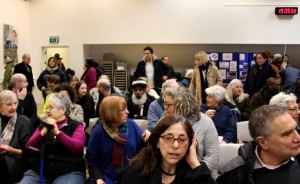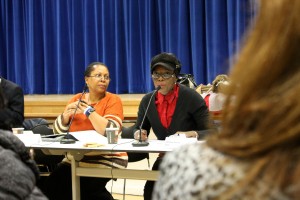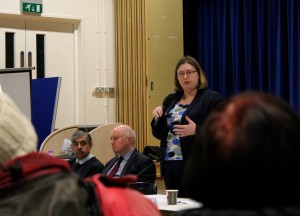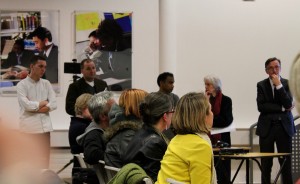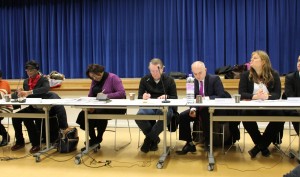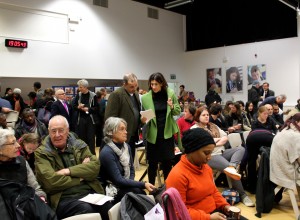 The Peckham and Nunhead Community Council Meeting at Harris Academy Peckham on Wednesday 12th February saw Peckham residents and local business owners gather to discuss, directly with Southwark councilors, the plans for Peckham Rye Station.
The Peckham and Nunhead Community Council Meeting at Harris Academy Peckham on Wednesday 12th February saw Peckham residents and local business owners gather to discuss, directly with Southwark councilors, the plans for Peckham Rye Station.
The chair announced the deputation that had been devised by local Peckham people, including Eileen Conn of Peckham Vision.
Ruth Kennedy, a Peckham resident for over 20 years, read the Deptuation Statement to the room. It outlined the lack of communication between Southwark Council, the GLA and Network Rail, and the subsequent lack of consultation with local people regarding the developing plans. It emphasised the threat the plans pose for the local economy, in particular the cultural quarter, and disputed the size and scale of the primarily residential block developments surrounding the station. The lack of basic priorities that the public had asked for, specifically public toilets and the open square, were also brought to Southwark’s attention.
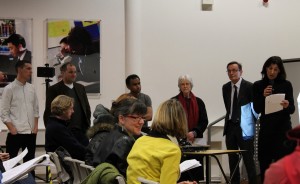 Ruth concluded by asking two questions:
Ruth concluded by asking two questions:
Please can we meet to co-construct a process of meaningful ongoing collaboration, that will see this development through to a fantastic transformation for Peckham?
Can we begin the next phase with the curation of a robust, creative workshop, involving all three partners and the community, so everyone is hearing the same messages, and is engaged in collaborative problem-solving together?
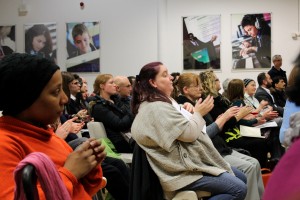 …which received tumultuous applause.
…which received tumultuous applause.
Councillor Fiona Colley (pictured) thanked those involved for devising the deputation and enthusiastically agreed to both points. She announced that a meeting between Southwark Council and Network Rail would be taking place next week in order to discuss the plans and that the speed of the development was controlled by a deadline for the Spring 2016 GLA fund of £5million, which in order to be completed, a planning application would need to be submitted by next week. Therefore, Colley has arranged to meet with the GLA to seek an extension of the deadline.
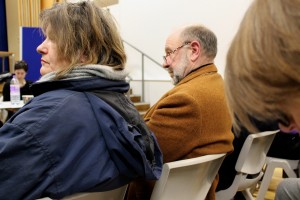 She agreed that the issue of public toilets needed to be addressed and apologised for the way the subject was handled at the January 18th Public Consultation meeting. With regards to the threat to industry as a result of the redevelopment, Colley was wholeheartedly behind protection of these businesses and incorporation of them into new plans so they are not priced out. As such, she announced that Southwark Council would not be using compulsory purchase orders for this project and that betting shops and payday lenders would be excluded from the area. She also said that the plans for Dovedale Court demonstrated a real “lack of vision” and clarity, and that Network Rail did indeed only give generic answers to question of potential rent prices at the last meeting.
She agreed that the issue of public toilets needed to be addressed and apologised for the way the subject was handled at the January 18th Public Consultation meeting. With regards to the threat to industry as a result of the redevelopment, Colley was wholeheartedly behind protection of these businesses and incorporation of them into new plans so they are not priced out. As such, she announced that Southwark Council would not be using compulsory purchase orders for this project and that betting shops and payday lenders would be excluded from the area. She also said that the plans for Dovedale Court demonstrated a real “lack of vision” and clarity, and that Network Rail did indeed only give generic answers to question of potential rent prices at the last meeting.
However, the issue of the seven-storey, residential buildings proposed around the station were keenly glossed over. Colley agreed that she saw little reason for the 30’s building to be torn down and that the height and density of the residential blocks should be discussed further with Network Rail, but she did not oppose their existence.
Among the victories that Peckham has won here, we are in danger of compromising on other aspects of the redevelopment that also pose a real threat to the carefully balanced ecosystem of Peckham Rye. It certainly suits Southwark Council to shift blame to Network Rail, yet we must remember that all parties were aware of the scale of the redevelopment plans.
Please feel free to leave your comments below in answer to these questions or any other statements throughout the blog.
Get in touch if you would like to contribute to our film about the Peckham Rye Station and Gateway Area Redevelopment Project. Just email production@spectacle.co.uk
See Peckham for more blogs and information.
Or visit PlanA, our general blog on urbanism, planning and architecture.
Spectacle homepage
Like Spectacle Documentaries on Facebook
Follow SpectacleMedia on Twitter

